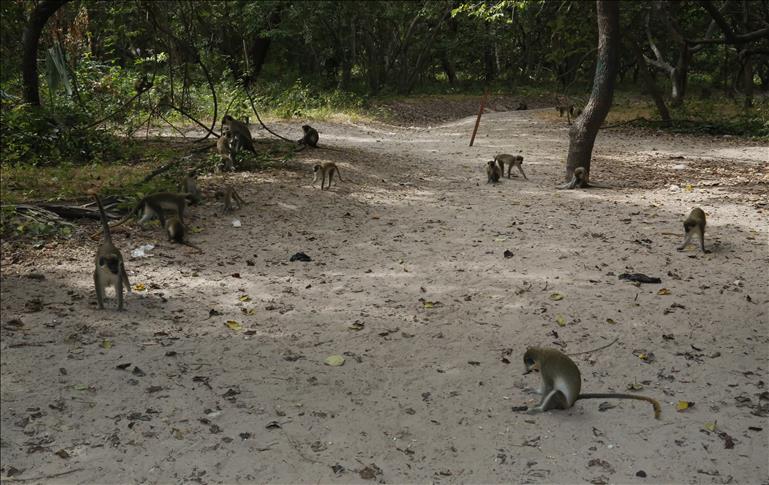
By Andrew Ross
NYERI COUNTY, KENYA
Baboons are making Mary Wairimu's life a nightmare.
"As you can see, we have just planted new crops," Wairimu, a farmer in Endarasha village in Kenya's central Nyeri County, told The Anadolu Agency as she pointed to her farm in the distance.
"The baboons usually come from the forest and destroy all the crops," she fumed. "They uproot and eat all the plants – not even the Nepia grass we grow as feed for our cows is spared."
She insisted that an electric fence set up near their land by the Kenya Wildlife Service provided no protection.
But these aren't the worst of Wairimu's problems.
"As long as you are dressed as a woman, they [the baboons] will disrespect you; they don't fear women," she said.
"In fact, we are sexually harassed by the animals," Wairimu told AA.
"I heard of one woman who was raped by a troop of monkeys and baboons," she said. "I heard she was badly injured."
Wairimu is not the only victim of harassment by various primates living in and around the nearby Aberdare National Park, 766 square kilometers of forests, valleys, waterfalls, moorlands and peaks.
The protected area provides a natural habitat for thousands of wild animals, including primates, more than 250 bird species, and 779 species of plant.
But many of the wild animals do not confine themselves to the protected areas, occasionally straying away from the park – especially during dry spells – looking for feed and water.
This brings them into direct conflict with neighboring human communities.
For those who farm close to the national park, baboons and monkeys have been a menace.
"The baboons – which in Kikuyu we call 'Nugu' – are very clever and troublesome," Johnston Kinyanjui, an Endarasha village elder and teacher by profession, told AA.
"They wake up early in the morning and immediately raid our farms," he fumed.
He says he was once attacked by a pair of baboons.
"I tried to chase them away from the farm, but I was chased away by two male baboons," Kinyanjui recalled. "If I wasn't wielding a machete, I'm sure the animals could have attacked me."
The village elder noted, however, that women in particular were the most vulnerable to harassment by animals.
"The animals have gone as far as touching their own private parts and showing them to the women," he said, adding that human males were rarely harassed.
"This animal is very intelligent," Kinyanjui insisted. "They can easily differentiate between men, boys, women and girls."
He said he knew of at least one woman who narrowly escaped rape by a troop of baboons.
"She was lucky that there were some men passing by," said the village elder. "If it wasn't for them, she would have been raped by those animals."
Resilient
Moses Wanjohi, another farmer, says the primates have proven to be extremely resilient.
"They usually invade my farm when the maize is almost ready for harvest," he told AA.
"They eat everything, from maize to carrots to cabbages," Wanjohi said. "And we're left with nothing."
He said attempts to drive the animals off usually failed.
"We lay traps, but none are ever caught," added Wanjohi.
"Sometimes we smear rat poison on maize to kill the animals, but it's as if they have a human brain – they never eat the poisoned food," said the farmer.
Catherine Wambani, the Kenya Wildlife Service's regional manager, acknowledged that wild animals were raiding human settlements outside Aberdare national park.
"There were areas that wild animals used to use when they moved seasonally," she told AA.
"They find human settlements that they have to pass through. This has led to an increase in conflict," Wambani suggested.
She criticized villagers who, during dry spells, plant cabbages along the river.
"I don't know what we expect our animals to do; this is definitely a recipe for conflict," said the official.
She also blamed communities living near the conservation area for escalating conflict with wild animals.
"In Aberdare, the communities cut the tasering wire," Wambani told AA. "They interfere with the voltage – that way they can have access through illegal routes into the park."
"When you undermine the fence that is supposed to protect you as a community member, what you are doing is escalating the level of conflict," she asserted.
Wambani said some of the cases of baboons raiding farms and terrorizing residents near the park were due to tampering with the electrical fence.
"We have animals that can learn. The primates are quick to learn. Once they know that the fence has been tampered with, they get out of the park," she admitted.
"It is difficult for us to make them unlearn that behavior," she added.
The official urged locals not to take matters into their own hands by harming or killing the animals.
But Kinyanjui, the Endarasha elder, insisted that the villagers did not venture into protected areas.
"Farmers from around this area, we don't go into the wildlife protected areas," he told AA.
"It is the animals who leave their protected areas and come to interfere with us," he insisted.
"The animals should be locked in the parks," said Kinyanjui.
"When we enter their side [protected areas], the government is quick to respond," he added. "But nothing happens when the animals invade our farms."
Anadolu Agency website contains only a portion of the news stories offered to subscribers in the AA News Broadcasting System (HAS), and in summarized form. Please contact us for subscription options.



